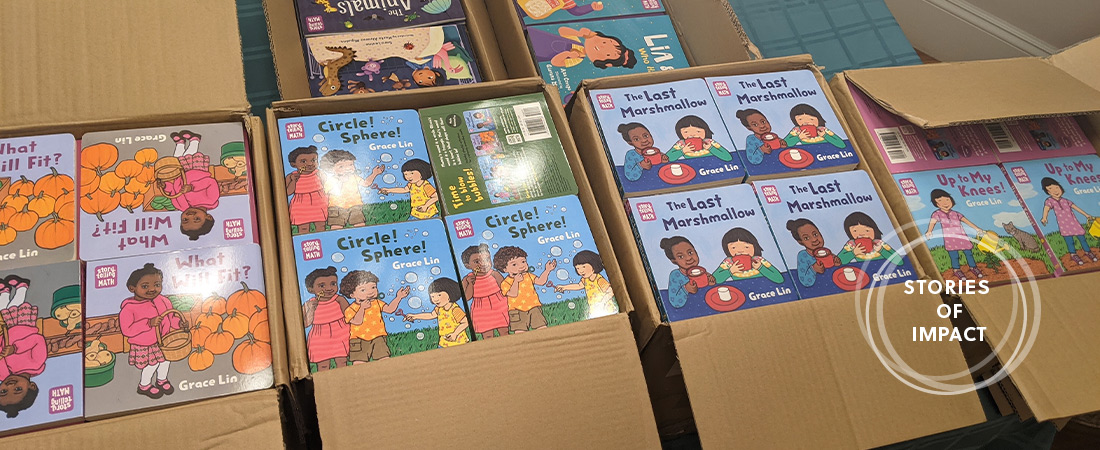Engaging Worcester Head Start Children and Families in Learning Math Together
Young Mathematicians supports remote teaching and learning during COVID-19 crisis.

The unprecedented challenges of 2020 haven’t stopped Head Start teacher Donna Servideo from doing her best for children and families in the city of Worcester, Massachusetts.
“In the beginning [of the pandemic], no one knew what Zoom was or how we were going to teach remotely,” says Servideo, an early childhood teacher within the Worcester Public Schools Head Start Program. “We closed so fast, we didn’t have time to put together learning kits. We didn’t know what learning materials children had at home.”
When onsite teaching for Worcester Head Start Programs shut down in March, Servideo was concerned about how to work remotely with her families, who depend on Head Start’s preschool program to help prepare their children for success in school and in life. She’d been teaching her three- to five-year-old preschoolers early mathematics—important concepts and skills for them to learn before entering kindergarten. Now, with schools closed, she had to rely on families to support their children’s math learning at home. She didn’t want the early math progress her preschoolers had gained to be lost to the COVID-19 crisis.
But Servideo had support. Since the spring, she has relied on staff from EDC’s Young Mathematicians (YM) initiative to help her inspire math learning at home among the families her program serves. She says the support has helped her navigate these uncharted waters.
“EDC and Young Mathematicians helped us learn new ways of teaching,” says Servideo, who is one of 90 educators participating in the Young Mathematicians in Worcester initiative.
During professional development sessions with YM facilitators this past year, Servideo learned how to conduct remote teaching sessions with families using tablets provided by the Worcester Public Schools. She also learned about math games that parents could play at home with their children, helping them continue to grow as learners even as the lockdown kept them from their physical Head Start classrooms.
“We [learned how to] connect families with math learning using basic, everyday household items such as utensils or socks,” Servideo says. With ongoing training from Young Mathematicians, Servideo also learned how to overcome the digital hurdles of remote teaching and to keep Head Start families and their children learning and practicing math at home. She combined remote group sessions with monthly, individualized meetings to ensure each child was mastering the mathematics material.
EDC’s Kristen Reed co-directs Young Mathematicians in Worcester with her colleague Jessica Young. Reed describes the effort as an opportunity to bring together early childhood programs, schools, community centers, libraries, and museums to improve the quality of early mathematics teaching and learning. She felt it was important to help providers like Servideo continue to foster math learning when COVID-19 interrupted in-person preschool learning.
“We wanted to support teachers in ways that they could connect families with math,” Reed says. “We created some activities that worked well in a remote context, where families and kids could engage in fun learning with the teacher’s guidance.”
Reed and co-director Jessica Young also wanted to provide families with some of the rich mathematical materials that they would have had in the Worcester Head Start centers. So in fall 2020, Young Mathematicians began producing and delivering math learning kits directly to families. The kits included printable mini-books, sets of “dot cards,” and games, with instructional booklets all available in the languages spoken in the city, including English, Spanish, Brazilian, Portuguese, and Arabic. Funding for the kits was provided by the Heising-Simons Foundation and Overdeck Family Foundation, and the effort was modeled on a similar National Science Foundation-funded initiative, which reached 400 families in Lawrence, Massachusetts, over the summer.
Servideo says the YM materials are helping Worcester Head Start families and children stay engaged in math learning during the pandemic. Popular tools include pattern block puzzle games, where children form the shapes of rocket ships, insects, and other objects using multicolored geometric shapes.
“The dot cards have been fun,” says Servideo. “The children see a certain number of dots on a card and can say how many dots there are. We start each group with this fun game as we wait for everyone to join the Zoom meetings. Families have also continued to play this game at home with the children and their siblings.”
Other materials are inspiring a class project.
“The children also liked [listening to] How Many Snails? and Five Creatures books over Zoom,” says Servideo, who also provides parents with a link to a recording of her reading books. “We plan to make a class book that is based on the concept of sorting learned in these books.”
Moving ahead in 2021, EDC and Young Mathematicians will continue supporting teachers, families, and young learners in communities such as Lawrence and Worcester.
“No matter what, we know that we’re going to be relying on families to provide a lot of the education to children this coming school year,” Reed says. “So, we’re making sure that families have the materials that they need.”
Servideo looks forward to transitioning to a hybrid learning model after COVID-19 restrictions are lifted. Until then, she’s learned to make remote teaching work.
“Having hands-on materials is what makes math fun and engaging while learning virtually,” Servideo says. “Since all children have the materials, it makes planning the math activities much easier.”
And as for her own development, Servideo will continue her virtual training sessions with the YM staff and her fellow educators. “Sharing ideas and brainstorming with other teachers will be helpful in continuing to plan hands-on, engaging math activities.”






